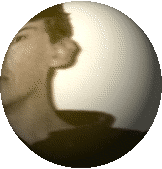|
BOOKS | ARTICLES | LECTURES | TRANSLATIONS | REVIEWS
 During my
college years, I was fascinated by mathematics and physics, but soon felt that there was more to existence than matter alone. I turned to agriculture and biology, to study the world of
growth, fruition and decay, which seemed to transcend the world of matter. Soon however, I got the same feeling as before: the biological realm was perhaps deeper than the world of
matter, but did it exhaust existence? I turned to psychology, to study the world of emotions and thoughts, and eventually ended up with the psychology of religion, which studies the
subtlest emotions and the deepest thoughts. Looking back on my student years, I might say that I climbed the Great Chain of Being, from matter to life to mind to... Spirit?
During my
college years, I was fascinated by mathematics and physics, but soon felt that there was more to existence than matter alone. I turned to agriculture and biology, to study the world of
growth, fruition and decay, which seemed to transcend the world of matter. Soon however, I got the same feeling as before: the biological realm was perhaps deeper than the world of
matter, but did it exhaust existence? I turned to psychology, to study the world of emotions and thoughts, and eventually ended up with the psychology of religion, which studies the
subtlest emotions and the deepest thoughts. Looking back on my student years, I might say that I climbed the Great Chain of Being, from matter to life to mind to... Spirit?
During these years, I also developed an interest in ways of knowing other than orthodox science, which led me to India, until I encountered Theosophy, a nineteenth century attempt to
find a deeper worldview, deeply religious without favoring any of the world religions, and a "perennial" philosophy that made room for higher spheres, and the reality of the inner
world. It even admitted of the possibility of life after death, and the scientific investigation of these processes by means of clairvoyance. This body of ideas unleashed a lot of
creativity in me, and I started writing about them, in several books, the last of which being Seven Spheres (1995, in Dutch). Studying the inner world of man within the framework
of the perennial philosophy seemed a promising option for me.
What attracted me immediately to the work of Ken Wilber, which I discovered around 1980, was that he articulated this existential feeling: we live in a world of many dimensions, many
of which can be studied, be it through natural science, mental science, or even the spiritual science of meditation. Far from wanting to prove that God could be fitted into the
framework of quantum physics, he proposed something else: quantum physics can be fitted into a larger scheme, that has room for other knowledge endeavers too, and ultimately for the
deepest of religious experiences. Again, this discovery made me want to write about these issues, which lead to the book about Wilber released in Dutch in 2001: Ken Wilber:
Thought as Passion. (It has been translated into five languages now: German, English, Spanish, Polish and Greek). To give web presence to Ken Wilber, I took over a website originally maintained by Norbert Scheepers, and made it into the site it now is.
Having been asked by Wilber to collect all the online criticism of his work I could find, this has resulted in hundreds of articles sent to me from all over the world. Wilber did not really engage this criticism, and around June 2006 publically announced the reasons for his non-response (see "The Wild West Wilber Report"), basically boiling down to: my critics don't get it, and are a waste of my time. Obviously, I disagreed with that assessment and continued my work of stimulating a critical discussion of Wilber's vision. I specialized in the topic of evolutionary theory and showed how Wilber is a crypto-creationist in mystical disguise, unable and/or unwilling to critically evaluate his assumptions, or even study this field of science in any reasonable detail. This ended my personal involvement with Wilber and his community.
I have been able to make a living as production manager, most of the time for one publisher of books about spirituality and psychology in Holland. In 1997 that job ended,
and I turned to web publishing as a less expensive and potentially more promising way of reaching people from all over the world. Thanks to the Dutch government I could spend one year
as a trainee for Internet Specialist, and I found a job as production manager at an advertising agency in Amsterdam, linked to the EuroRSCG network, where I worked for Intel's global websites (in Europe and Asia). In 2007 I moved on to Lost Boys, where I was webmaster of the global websites of Sara Lee (owner of Douwe Egberts, Pickwick, Senseo, Sanex and a lot of other brands). In 2015 I moved over to Emakina, establishing a service desk to support the B2B websites of Unilever Food Services.
During the coronavirus pandemic I wrote a two-volume online book The Corona Conspiracy: Combatting Disinformation about the Coronavirus, volume one of which is also available on Amazon. While I have never been able to make a living from my writing activities, they continue to take up an important part of my spare time.
Frank Visser
Amsterdam,
[email protected]
Linkedin
Twitter
|